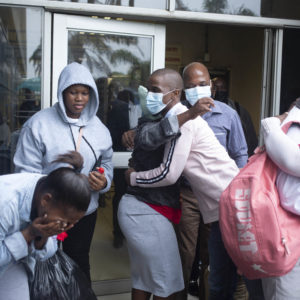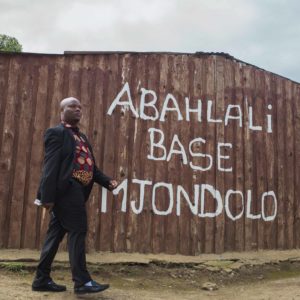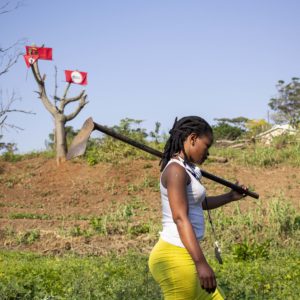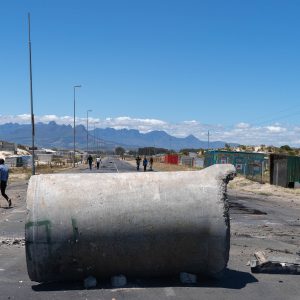Shack dwellers hitting back at repression
Residents of the eKhenana occupation in Cato Manor believe the justice system in Durban is being misused to repress their community.
Author:
24 November 2021
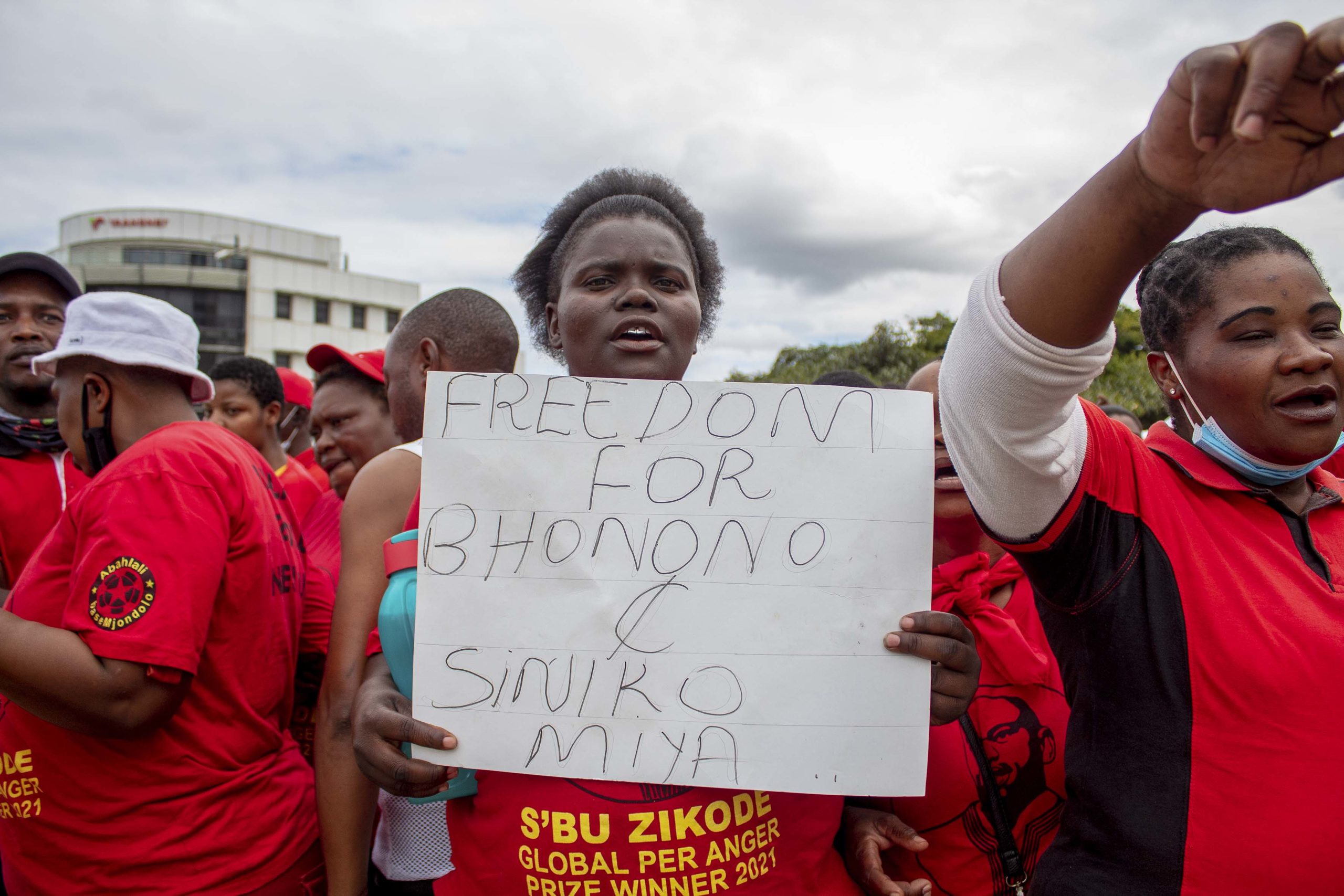
The office of the KwaZulu-Natal director of public prosecutions has appointed an advocate to investigate complaints by Abahlali baseMjondolo that ANC leaders in Cato Manor are allegedly instructing the police and the criminal justice system in Durban to repress activists in the eKhenana occupation.
The advocate was appointed on 27 October after Abahlali complained about the number of eKhenana residents being arrested and held in prison without bail. Over a period of nine months, 10 activists have been arrested. With the exception of the most recent arrests, all charges were later withdrawn for lack of evidence. One case is still pending. The organisation has said that all these arrests will be legally challenged as malicious prosecution.
The first arrests began in March when Ayanda Ngila, 29, Lindokuhle Mnguni, 27, and Landu Shazi, 33, were arrested and charged with murder. They were held without bail for six months before the charges were withdrawn.
Two months later, Maphiwe Gasela, 29, Siniko Miya, 29, and deputy president of Abahlali baseMjondolo Mqapheli Bonono, 39, were arrested on charges of conspiracy to commit murder, denied bail and sent to Westville Prison for two weeks before bail was granted. The charges against the trio were withdrawn on 4 October.
Related article:
Then on 8 October, three women, Nokuthula Mabaso, 39, Thozama Mazwi, 33, and Sindiswa Ngcobo, 26, were arrested on charges of assault with intent to cause grievous bodily harm related to an incident that took place more than a year ago in which they say they were protecting a migrant who was being assaulted by an ANC supporter. They were released on bail conditions that prohibit them from returning to eKhenana.
Phumelele Mkhize, 30, was arrested two days after the three women alongside Gasela, who was taken by police for a second time. Both were charged with assault with intent to cause grievous bodily harm in relation to the same matter as the three women arrested on 8 October.
Mkhize and Gasela were granted bail on 25 October on bail conditions that also prohibit them from returning to eKhenana. Their homes were set alight and gutted the following evening. Abahlali blames local ANC members for the arson attack.
Complaints against ANC leaders
The initial occupation of the land that became eKhenana was rushed and chaotic as people who had been evicted by the state sought unused land on which to live. Later the occupation was organised and a decision was made to affiliate with Abahlali.
eKhenana (Canaan) was then developed as a safe space where 109 families could grow and raise enough vegetables and chickens to feed the whole settlement and sell the surplus to fund community needs. Its members term the internationally known community “a socialist commune”. But the ANC-run eThekwini municipality has ordered the demolition of the residents’ shacks and the burning of their building materials several times in the past three years, defying a high court order barring it from evicting residents.
Abahlali sent the KwaZulu-Natal director of public prosecutions, Elaine Zungu, a letter of complaint on 12 November, writing that ANC leader NS Ngubane was directing the police and criminal justice system against the community. The letter identifies ANC members who have allegedly assaulted Abahlali members, raped one and burned down two residents’ homes. In all cases, police have refused to make arrests, despite the community identifying the suspects.
Related article:
Abahlali president S’bu Zikode said minister of police Bheki Cele had promised to speak to the KwaZulu-Natal provincial police commissioner but had not done so. Zikode said that Cele seemed to be dodging Abahlali’s phone calls.
“The South African Human Rights Commission has been informed and we have not heard any response or action other than an acknowledgment of receipt. The KwaZulu-Natal ANC provincial leadership has also not bothered to intervene despite the fact that these complaints implicate their leaders,” said Zikode.
Repressing the impoverished
Retired KwaZulu-Natal bishop in the Anglican diocese Rubin Phillip said since Abahlali launched in 2005, it had faced assassinations, police brutality and repeated arrests of its members. “In all these years and after hundreds of arrests there has never been a single conviction. Over a period of 16 years, the criminal justice system has been systematically misused to repress a democratic organisation of the poor,” Phillip said.
Nomzamo Zondo, director of the Socio-Economic Rights Institute (Seri), says she is “concerned about how both the National Prosecuting Authority (NPA) and police have acted during arrests and after people have appeared in court, specifically to do with the number of times people appear in court before they are released on bail”.
Seri was disappointed that in the case of eKhenana residents, the NPA had not ensured that the accused Abahlali members enjoyed their constitutional right to a speedy bail application process. “In cases where there are sufficient allegations to sustain a prosecution, the accused should not be detained for weeks and months. So far, the case for the eKhenana accused has been the opposite. They haven’t been able to enjoy the right to bail swiftly and they haven’t felt they have been dealing with a fair and impartial NPA.”
Related article:
But Zungu maintained that the arrests and initial prosecution of the Abahlali members are above board and said the NPA would not be investigating malfeasance by the criminal justice system in the province, despite her office having sent a letter appointing an advocate to do so.
“The prosecutor relied on prima facie evidence in the docket. The docket consisted of eye witness affidavits and other corroborating evidence. As the investigation progressed, the eyewitnesses refused to be interviewed by the prosecutor and some of them became untraceable. Witnesses that could be traced were interviewed and they recanted their version as contained in the affidavit,” said Zungu.
She added that magistrates weigh up any opposition to bail made by the prosecution and “decide if bail should be refused or granted. The state does not deny anyone the right to apply for bail.”
However, prosecutors often have the upper hand in bail applications. Sithuthukile Mkhize, head of the civil and political justice programme at the Centre for Applied Legal Studies, said that even if accused people convince the court that they meet all the requirements for bail, “the court may not be inclined to grant bail or may delay in issuing the bail” if the state provides contrary evidence.
A threatening new vision
University of Johannesburg professor of journalism and activist Jane Duncan said the eKhenana settlement offered “a vision of an alternative society: one based not on dog-eat-dog competition but on mutual support and solidarity. That vision must be profoundly threatening to the powers that be as it risks making them obsolete.”
Duncan added that “the criminal justice system, or elements within it, are misusing it to break the community through trumped up arrests and bogus prosecutions. Those leading the repression should be identified and isolated. This will give a face to the repression and make it easier to tackle. It’ll also raise the costs of doing nothing for the NPA, as a spotlight will be put on those responsible. As things stand, they can just hide behind a faceless state.”
Cape Town shack dwellers’ movement Intlungu YaseMatyotyombeni Movement (IYM) also came out in support of Abahlali. The IYM formed in 2020 after people who were retrenched during the first wave of Covid-19 set up shacks on vacant land in Khayelitsha following evictions from rented accommodation.
Related article:
“The ANC in KwaZulu-Natal has been part of the people who don’t want to be challenged by social movements. eThekwini municipality is suppressing [Abahlali] comrades, using courts to get orders. We also know that the eKhenana land occupation has been denied the right to report cases at Cato Manor police station. [Abahlali] comrades have been facing rape cases, and the police pretend as if nothing is happening,” said spokesperson Mabhelandile Twani. “This is a cheap strategy to frustrate [Abahlali] and make them leave the eKhenana land occupation. Bheki Cele, we are tired of the police who still have an apartheid attitude against land occupations. The ANC must stop this. We will fight back against any form of police brutality against Black working-class land occupations.”
This is not the first time the criminal justice system has been misused against social movements. In 2003, Cape Town’s serious and violent crimes unit frequently invaded and tear gassed learners and teachers in a school the Anti-Eviction Campaign set up for children without places in government schools in Mandela Park, Khayelitsha. Like Ngina, Mnguli and Shazi, the campaign’s chairperson, Max Ntanyana, was jailed for several months in the notorious Pollsmoor prison on trumped up charges of intimidation and breaking his bail conditions. He had earlier been interdicted from being a member of the Anti-Eviction Campaign, charged with contempt of court for continuing to organise and released on bail. Eventually, Ntanyana succeeded in having the high court overturn his bail conditions as unconstitutional.
In 2011, Bhayiza Miya of the Thembelihle Crisis Committee in Lenasia, Johannesburg, was arrested on charges of public violence and intimidation without evidence and denied bail for just more than a month. He also had to approach the high court, which ordered the magistrates’ court to grant bail.

